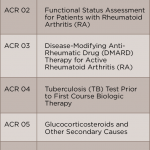One of the foundational benefits of the RISE registry is its designation as a CMS-approved QCDR, … ensuring the ACR creates & maintains a portfolio of rheumatology-specific quality measures for reporting purposes. Thus, rheumatologists are not forced to report measures meant for primary care that are not as directly relevant to their practices.
You may have heard of the ACR’s new RISE Practice Improvement Module. This new continuing medical education (CME) and maintenance of certification (MOC) activity within RISE is meant to provide a tool for clinicians to improve an aspect of their practice that is meaningful to them. In this module, RISE users choose a specific quality measure, create an improvement plan and implement changes for a 90-day period. Users are then asked to reflect on their progress. Thus, the data within RISE can lead to changes implemented to improve patient care.
One of the foundational benefits of the RISE registry is its designation as a CMS-approved QCDR. As a QCDR, RISE not only collects data from EHRs and uploads quality performance data on the dashboard for users to analyze, but it has also been instrumental in ensuring the ACR creates and maintains a portfolio of rheumatology-specific quality measures for reporting purposes. Thus, rheumatologists are not forced to report measures meant for primary care that are not as directly relevant to their practices. The ACR’s methodologically rigorous, evidence-based clinical practice guidelines serve as the basis for many of these measures, so users are tracking patient care according to best practices.
Sharing quality measure data is another example of how clinicians contribute to research. When aggregated, these data allow the RISE team to identify opportunities for improving evidence-based practice and to study the health and quality of care for people with rheumatic disease, including identifying and addressing potential health disparities.
Traditional Research, New Opportunities
With data on more than 2.4 million patients from more than 1,000 providers within the registry, RISE is a data repository that represents the collective clinical observations of rheumatologists and is a unique source to advance research in rheumatic diseases.
Because RISE automatically extracts all EHR data, the registry captures information on all diseases seen by rheumatologists and rheumatology professionals, including rare disease diagnoses and therapies. Collecting data on these rare conditions allows for longitudinal studies and the future development of disease-specific quality measures.
For example, researchers have identified a very large cohort of more than 3,000 patients with sarcoidosis and characterized treatment patterns across rheumatology practices. This is one of the largest cohorts of patients with sarcoidosis ever assembled.
Recently, the CMS approved the ACR’s request to obtain and link Medicare claims data with RISE. This has two benefits. First, it is helping us better understand the cost of care for patients with rheumatic diseases. For clinicians who are reporting MIPS, the weighting of the cost-of-care category is increasing each year (and is proposed to make up 30% of the overall score by 2022). Thus it is essential to understand the cost of caring for our patients and to identify how that varies among clinicians.
Second, it is expanding the RISE research data pool by marrying the robust data in both the clinical and claims datasets. For researchers, this means the possible analysis of a broader range of topics, including elements beyond what is typically captured in EHR systems, such as hospitalizations and drug fills.
RISE also holds potential in the growing field of precision medicine—the goal of which is to help tailor therapy options for each patient based on specific characteristics, allowing for empirically better choices for a given individual. Thus, the registry has the potential to serve as a strong foundation for the launch of a precision medicine initiative that will link to biospecimens and accelerate our understanding of distinct patient characteristics and successful therapies.
The RISE registry is placing researchers at the forefront of rheumatology investigations, shaping the field as we discover more about rheumatic diseases and identify better therapeutic strategies for our patients.



